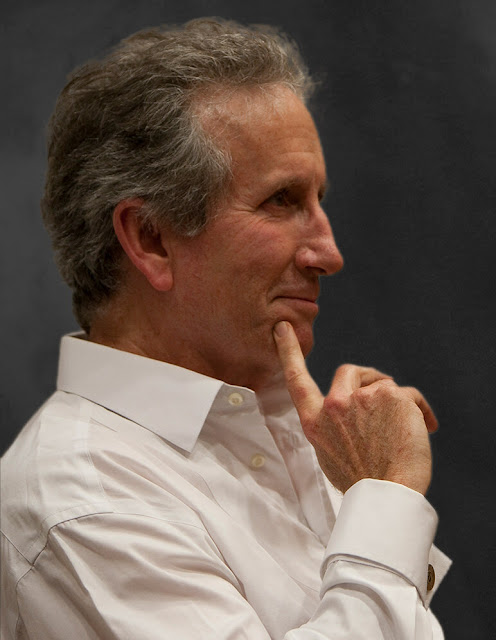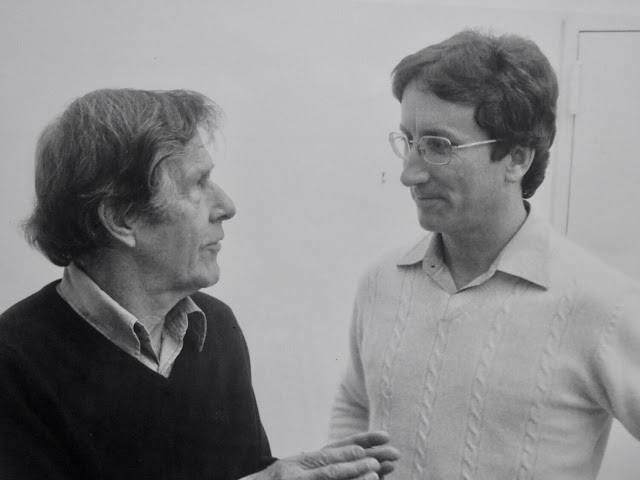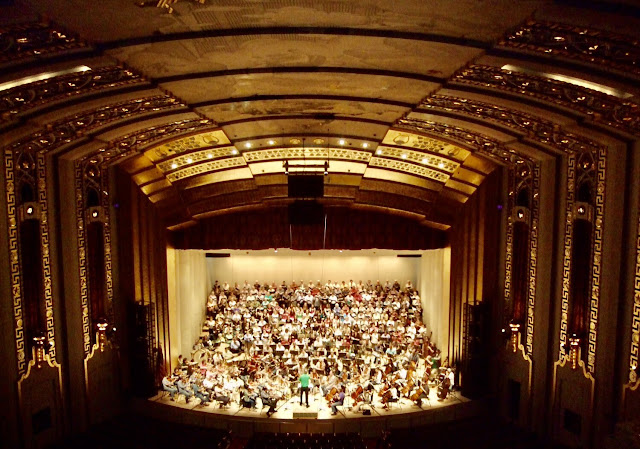 |
| Stephen Montague |
If you ask composer Stephen Montague about the style of his music, his response is likely to echo the maverick American composer Henry Cowell (1897-1965) who wanted to live in the whole world of music, not just one corner. Stephen is 80 this year and remains just as much a free musical spirit as before. I recently met up with him to chat about his forthcoming birthday concert at St John's Smith Square, where Southbank Sinfonia will be joined by an array of conductors and other performers to celebrate Stephen with a programme of his music ranging from the 1990s to recent works.
When it comes to music, Stephen admits that he is interested in too many things, which is unfashionable at the moment; composers such as Philip Glass and Steve Reich have made names for themselves by cultivating a particular corner of the musical landscape. But Stephen likes writing everything, something that he feels he takes unconsciously on board, so his style can be experimental or tonal and use functional harmony, esoteric or full Hollywood-style film score. This has been unfashionable during Stephen's lifetime and has applied to the visual arts too.
But every piece has Stephen's hallmark on it in some way, he feels that he tends toward recognisable harmonies and any dirty dissonances often resolve. He now does exactly what he wants to do and can take the consequences, and like Mozart, he knows for whom he is writing and the sort of music needed. Stephen recently wrote a large-scale ballet for Birmingham Royal Ballet; being a ballet dance piece, he clearly understood that this was not the time for experimentalism and that dancers have to be able to count so it wasn't time for irregularity.
 |
| John Cage & Stephen Montague in 1982 |
For his 70th birthday, Richard Heason (then director of St John's Smith Square) did a celebratory concert and it was around the time of the John Cage centenary. Stephen had worked with Cage, so the 2013 birthday celebrations included two concerts, one of which was a theatrical event that Stephen had created, A Dinner Party for John Cage, [see Frances Wilson's review on Bachtrack] and the other was a concert of Stephen's orchestral works. The celebrations went well, and Richard invited Stephen back for his 75th birthday, and these celebrations included six concerts over two days including an all-night performance of Satie's Vexations, plus chamber music, videos, installations, and concerts including children under the age of nine.
Again, the concerts went well, but they were hard work; there were some 200 performers involved and the organisation of the events was something of a tour de force. So, for his 80th birthday, the idea was to do something far simpler. Then St John's Smith Square joined forces with Southbank Sinfonia, which is now resident at the hall. Southbank Sinfonia is an orchestra that provides experience for young players recently out of college, and as such Richard thought Stephen's music with its wide variety from 'weird stuff' to conventional would be great experience for the players. Hence, the idea for an 80th birthday concert with Southbank Sinfonia focusing on a wide variety of Stephen's work.
Richard wanted to include Stephen's Dark Sun - August 1945 in the concert. Richard had performed the work before; it was written for CoMA (Contemporary Music for All) in 1995 and it is certainly not a birthday piece, being written for the fiftieth anniversary of the bombing of Hiroshima. It requires massive forces and Stephen thought that it would be a one-off, but it is relatively open score with quite a bit of freedom about what notes are played, so it has had many subsequent performances. The orchestral forces are based on a core of professionals surrounded by amateurs of all levels from the highly proficient to the novice. As part of its residency at St John's Smith Square, Southbank Sinfonia is reaching out to the community for performances, so this style of the piece was ideal.
 |
| Stephen Montague's Dark Sun at a performance in 2019 |
The performers in Dark Sun - August 1945 will thus include Southbank Sinfonia, members of CoMA, students from Trinity Laban including Stephen's student composers, 17 and 18-year-olds from Lambeth Music Service, young players from the Centre for Young Musicians and more mature singers from Kentish Town Cantorum. Thus it becomes a flagship work for what Southbank Sinfonia is trying to do, mixing young and old, professional and novice, including people like a friend of Stephen's from his tennis club!
Dark Sun will be in the second half, so Stephen has leavened this half with two pieces for the toy piano, played by Xenia Pestova Bennett. As he wryly puts it, 'what's not to love about a toy piano'. First comes Almost a Lullaby which will segue into the opening, bone-crunching chord of Dark Sun, played by 140 people. Then at the end of Dark Sun, the music will move directly into Mirabella: a Tarantella for toy piano and the evening ends with a surprise!
Part one of the concert is somewhat lighter. It begins with the world premiere of Introit for St John's, a new incarnation of an older piece. It began as a commission for brass quintet from the Bournemouth Symphony Orchestra, and Stephen then expanded it for the opening of the Francis Crick Institute, and he has created a new version again for St John's. As Stephen describes it, the work begins as a normal brass fanfare, but then goes off the rails and percussionists placed in a circle around the performers at balcony level bring the piece to an end with a sort of percussion Mexican wave.
This is followed by Stephen's 1995 piece, Snakebite! for chamber orchestra and folk fiddler. It was commissioned to go with Haydn's Farewell Symphony and uses the same sized orchestra, but Stephen's piece is based on the American folk tune, Dusty Miller and so would have formed quite a contrast with the Haydn. The piece arose from Stephen's experiences whilst teaching in Texas in 1995. The joy of being there was being able to listen to the Country fiddlers, and Stephen decided he wanted to create a concert work with a Country flavour. The title was inspired by the Rattlesnake Roundup, in Sweetwater, Texas. And an old Country fiddler told him how the plains Indians survived a snake bite by lying still and slowing their heartbeat down for 18 hours till the poison had passed through them. And in Stephen's piece, there is a musical evocation of the passing of this poison through Dusty Miller.
The first half ends with the world premiere of Beyond the Stone Horizon, for full orchestra. This has its origins in an early commission which was extremely prescriptive. Fortunately, Stephen discovered the commissioner was fond of Brahms and Bach, and that whilst Brahms was working on his fourth symphony he was editing Bach's works. So, Stephen's piece is based on the chaconne from the fourth movement of Brahms' Symphony No. 4, itself in turn based on Bach. But Stephen deconstructs it and only gradually does the Chaconne theme appear.
The original commission was premiered in 2006 in a venue that could only hold a small orchestra, so Stephen was not able to write for the number of players he wanted. So, though there were one or two subsequent performances, he withdrew the work. Now he has recomposed it for a far larger orchestra, expanding it in length and in terms of the forces needed, and he is now happy with the way it has turned out. Unfortunately, the original commissioner is no longer around to be able to hear the result, but it will provide a thunderous finale to the first half.
There is a range of conductors for the evening. Snakebite! will be conducted by a friend of Stephen's from Texas, Rob Smith, and the other conductors are Augustina Kapoli, Richard Heason and Stephen himself (for Dark Sun).
When I ask about how he approaches the question of the style of a piece, Stephen gives as an example his ballet for Birmingham Royal Ballet. Commissioned for Sir David Bintley to choreograph, The King Dances was a ballet based on King Louis XIV's all-night spectacular, Le Ballet de la Nuit. David Bintley is very musical, which Stephen adds is not always a good thing, but in this case, it was. David Bintley wanted to include the full range of Louis' original from simple processions to the unbelievable, so a wide scope of emotions. And it meant that in some movements, Stephen had scope to do something really weird and did so. The music goes from tonal to phantasmagoria, a witches' Sabbath and electronics, D minor to Bach to avant-garde. David Bintley did not put many limits on Stephen and he has happy memories of the project. It was filmed for the BBC as part of a longer programme [the documentary, The King Who Invented Ballet: Louis XIV and the Noble Art of Dance, is on YouTube, as is the ballet itself]
Stephen quotes one of his more outrageous pieces, a Manchester Festival commission, a concerto for klaxon horn and automobiles! It was a rather outrageous piece, not one he particularly wants to be known for, not one of his more profound works, but amusing. It has been done a lot, gets good publicity and good audiences.
Stephen's family left England for America in the 1630s under dubious circumstances, owing money to the parish. When Stephen married his first wife, they did so in the parish from where his ancestors had left, and during the ceremony, the vicar joked about Stephen still owing the money.
As far as Stephen himself he feels mid-Atlantic and on his best days, he can go either way. At the ISCM World Music Days, the USA would not claim him as he lives in the UK, and the UK would not claim him since he's American though now he has dual nationality. He loves living here and wouldn't trade it for anything. As a composer, he feels more American than British because he does not feel the weight of the earlier British composers, he is not under the shadow of Elgar, Holst or Britten. He likes being a free spirit and thinks his music more reflects an American freedom to be independent, without a weight of tradition.
He went to Florida State University where the teaching under Carlisle Floyd (1926-2021) was very conservative. Then when he changed university to do his doctorate, the music was seriously 12-tone, though later there was exposure to minimalism which he embraced as an escape from the acidic hothouse 12-tone fraternity. He went to Warsaw on a Fulbright Scholarship and whilst there he went to every concert at the Warsaw Festival. He describes it as an education, but there were far too many note clusters, and when he heard a British live-electronic group, Intermodulation (co-founded by British composers Tim Souster and Roger Smalley) playing Terry Riley it felt like a revelation and he felt he wanted to do that, and Minimalism was an influence during the 1970s.
 |
| Stephen Montague in Singapore in 2018 |
But Stephen makes an intriguing comment, that audiences will forgive any kind of dissonance so long as there is an infectious rhythm. He is interested in the audience, though he grew up in the era of 'who cares about the audience'. His response is that he does, he cares though he doesn't pander; but he likes to take the audience from somewhere tonal to somewhere they don't know.
However, he feels the composer is not always the best person to say what a piece is about. For instance, he can say all he wants about Beyond the Stone Horizon being a variation on the Chaconne from Brahms' Symphony No. 4, but if the audience cannot hear this link, then perhaps it is all in his mind. And it is interesting to consider something that pleases you. The best composers often have a moment you like but cannot explain why it is magical, a combination of forces pulling in different ways. We all get the moment when the hair stands up on the back of your neck, but how to explain it? And performers can take his material and do what they want. He feels he should never be too prescriptive; in the moment, when a great performer plays your music they make you sound better. Stephen enjoys this type of collaboration, the symbiotic relationship.
Snakebite! - 16 March 2023 at St John's Smith Square
Southbank Sinfonia, Students from Trinity Laban Conservatoire of Music and Dance, Participants from Contemporary Music for All (CoMA), Lambeth Music Service, Kentish Town Cantores, Stephen Montague, Rob Smith, Richard Heason, and Augustina Kapoti (Conductors), Xenia Pestova Bennett (Toy Piano)
See website for details
Never miss out on future posts by following us
The blog is free, but I'd be delighted if you were to show your appreciation by buying me a coffee.
Elsewhere on this blog
- Sending everyone away with a smile: Academy of Ancient Music in Purcell and Locke - concert review
- Shifting harmonies & tonal instability: Kitty Whately & Joseph Middleton are sympathetic & communicative in their programme of late-Romantic lieder on Befreit: A Soul Surrendered - record review
- Once you hear it, I guarantee you'll be seduced: Arne Nordheim's The Tempest, Suite from the Ballet in a new recording from Bergen - record review
- A journey through sound: looking up | looking out from a cellar full of noise - a trumpet, a tuba & live electronics create a bit of magic - record review
- An enjoyable romp: Rossini's 1825 coronation opera Il viaggio a Reims from English Touring Opera - opera review
- Style and youthful charm: English Touring Opera brings out the musical delights of Donizetti's murderous heroine, Lucrezia Borgia - opera review
- With Arctic she wanted to provide positivity and hope, to show what is worth preserving: Norwegian violinist Eldbjørg Hemsing on her latest project - interview
- Keenly dramatic: Puccini's Tosca at Opera North with a feisty Tosca, an unexpected Cavaradossi and a remarkable Scarpia - record review
- Intriguing reinventions: Danish accordion player Bjarke Mogensen's Album for Astor - record review
- Two major role debuts as ETO launches Spring tour with strong revival of Handel's Giulio Cesare - opera review
- Moments of musical magic: Dvorak's Rusalka at Covent Garden with Asmik Grigorian, & David Butt Philip conducted by Semyon Bychkov - opera review
- Home

.jpg)









No comments:
Post a Comment